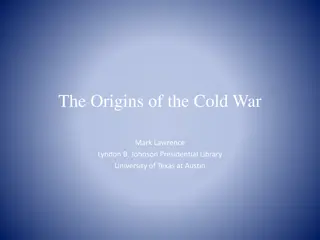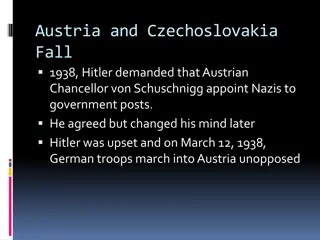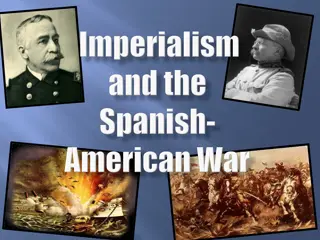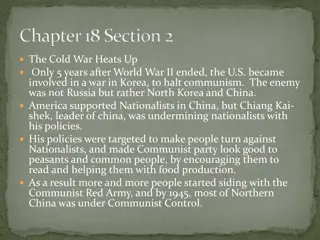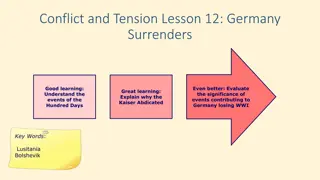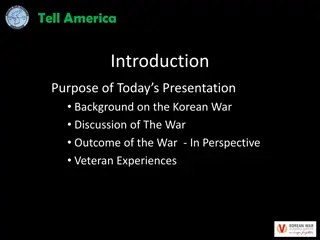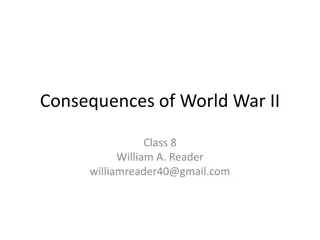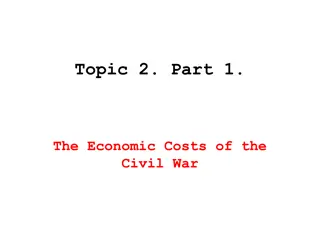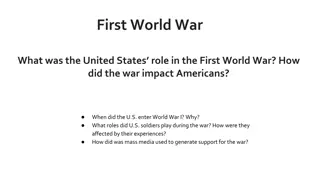Understanding the Origins of the Hundred Years' War
In the Middle Ages, the Hundred Years' War between England and France spanned 116 years as they fought for control. The conflict began in 1337 when the French king confiscated English territory, leading Edward III to claim the French throne. The war's causes included disputes over territory, economic interests, alliances, and personal ambitions. Explore the complexities that ignited this historic conflict.
Download Presentation

Please find below an Image/Link to download the presentation.
The content on the website is provided AS IS for your information and personal use only. It may not be sold, licensed, or shared on other websites without obtaining consent from the author. Download presentation by click this link. If you encounter any issues during the download, it is possible that the publisher has removed the file from their server.
E N D
Presentation Transcript
Classwork Wednesday, 17 July 2024 The 100 Year War LO: To understand why the 100 Years War started
THE HUNDRED YEARS WAR Learning Objectives: To know the causes of the Hundred Years War To appreciate the main events that took place during the Hundred Years War To be able to answer Question 2 on an examination paper for Britain: Migration, Empires and the People
To know the causes of the Hundred Years War In the Middle Ages, a war between England and France lasted for 116 YEARS, in which the two countries fought for control of France. Although it lasted longer, it is most commonly known as the Hundred Years War because it is simpler to remember. 1337 1453
Why did The Hundred Years War begin? In 1337 the French king confiscated most of the remaining English territory in France. The English king - Edward III - didn t accept this, and in fact declared himself to be the rightful king of all of France, because he was the previous French king s nephew, but there was more than one reason for this: England still controlled Gascony, a large area of Land in southern France which produced large amounts of wine that made England a lot of money- the king of France threatened invade. England sold a lot of the wool it produced to Flanders an area just outside the north-east of France, where it was turned to cloth and sold. This trade made England a lot of money but the King of France threatened to take over Flanders and stop this. England was at war with Scotland and the French promised to help Scotland defeat the English- which outraged Edward. Edward s grandfather had been King of France and he thought he had a stronger claim to the French Throne than the current King, Philip VI Edward was 24 in 1337 and felt he had to live up to his fathers reputation as a great king. The young king saw defeating the French and reclaiming all the land lost by King John as a way of achieving glory.
To know the reasons Britain was unsettled in the early 1800s In your book, explain the four problems SENTENCE STARTERS: ONE CAUSE OF THE HUNDRED YEARS WAR WAS ANOTHER CAUSE OF THE HUNDRED YEARS WAR WAS AN ADDITIONAL CAUSE OF THE HUNDRED YEARS WAR WAS A FINAL CAUSE OF THE HUNDRED YEARS WAR WAS EXTENSION: What links and/or similarities can you identify between the four causes?
THE HUNDRED YEARS WAR Learning Objectives: To know the causes of the Hundred Years War To appreciate the main events that took place during the Hundred Years War To be able to answer Question 2 on an examination paper for Britain: Migration, Empires and the People
To appreciate the main events that took place during the Hundred Years War Create a graph by judging which side was winning in each year. It is important that you also explain in each column WHY that side was winning. EXTENSION: In your opinion, who won the Hundred Years War? Give reasons for your answer.
1337 1346 1356 1360 The Hundred Years War between England and France began in 1337. It was actually a series of battles, instead of one huge war. The war started because the English Kings felt that they had a claim to the throne of France. The French Kings disagreed. That meant war! The Battle of Cr cy was fought in August 1346 near Cr cy, in northern France. The English army were battle-hardened from fighting regularly against Scotland and won a decisive victory. The battle crippled the French army's ability to come to the aid of Calais, which fell to the English the following year. The Battle of Poitiers was fought in September 1356. The Crown Prince of England managed to defeat and capture John II, King of France. It was the second great English victory of the war. Despite having a small army, England was doing really well. After being defeated at Cr cy and Poitiers, together with some other minor battles, John II, King of France was forced to sign the Treaty of Br tigny in 1360. The French ceded extensive territories in north-western France to England. 1380 1415 1429 1453 By 1380, the English were not is as good condition. The English king was old, and his son had died from a disease that he caught in the war. The French leader, Charles V, had managed to win back most of the land that was given to England in the Treaty of Br tigny. In 1415, the English King Henry V raised troops and set sail for France. He was hoping to show how strong and powerful he was, but the French army were quick to block him. The two armies met near a town called Agincourt in October 1415. Despite being heavily outnumbered, the English won. The French fought back. Their army had their first major victory in 1429. The English had been besieging the city of Orleans for six months. But the French were rallied by Jean of Arc, a teenager with visions from God, whose forces sallied from the city to attack the British, causing devastating casualties and forcing them to abandon the siege. The Hundred Years War ended in 1453. It had raged for 116 years. The Kings who were alive when it began were long since dead and the War spanned 5 generations of Kings. Ultimately, the French won as the English Kings stopped trying to claim ownership of French land.
To be able to answer Question 2 on an exam paper for Migration, Empires and the People Explain the significance of the Hundred Years War for the development of England. [8 Marks]
To be able to answer Question 2 on an exam paper for Migration, Empires and the People Explain the significance of the Hundred Years War for the development of England. [8 Marks] The Hundred Years War was significant in the short term because For example Crecy and Poitiers? Agincourt? This made it significant because The Hundred Years War was significant in the long term because For example Sense of Destiny? Identity? This made it significant because..
THE HUNDRED YEARS WAR Learning Objectives: To know the causes of the Hundred Years War To appreciate the main events that took place during the Hundred Years War To be able to answer Question 2 on an examination paper for Britain: Migration, Empires and the People


![❤[PDF]⚡ Civil War Talks: Further Reminiscences of George S. Bernard and His Fel](/thumb/20551/pdf-civil-war-talks-further-reminiscences-of-george-s-bernard-and-his-fel.jpg)
